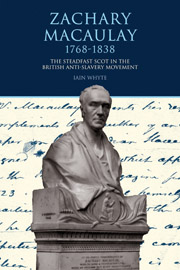Book contents
- Frontmatter
- Contents
- Foreword
- Acknowledgements
- Abbreviations
- List of Illustrations
- Chronology
- Introduction
- 1 From Inverary to the Sierra Leone River
- 2 Slave Traders and French Invaders
- 3 Captive in Love—to Selina Mills
- 4 The Trials of the Governor
- 5 Caught in a Multitude of Tasks
- 6 Clapham, Family and Friends
- 7 Attempting to Win France for Abolition
- 8 ‘Let Us Look it Up in Macaulay’—The Anti-Slavery Arms Manufacturer
- 9 Commerce and Conflict
- 10 Triumph and Tragedy on the Path to Glory
- 11 As Others Saw Him—As We Might Assess Him
- Bibliography
- Index
Introduction
- Frontmatter
- Contents
- Foreword
- Acknowledgements
- Abbreviations
- List of Illustrations
- Chronology
- Introduction
- 1 From Inverary to the Sierra Leone River
- 2 Slave Traders and French Invaders
- 3 Captive in Love—to Selina Mills
- 4 The Trials of the Governor
- 5 Caught in a Multitude of Tasks
- 6 Clapham, Family and Friends
- 7 Attempting to Win France for Abolition
- 8 ‘Let Us Look it Up in Macaulay’—The Anti-Slavery Arms Manufacturer
- 9 Commerce and Conflict
- 10 Triumph and Tragedy on the Path to Glory
- 11 As Others Saw Him—As We Might Assess Him
- Bibliography
- Index
Summary
On a cold February afternoon in 2009 mourners gathered in the graveyard of Holy Cross Episcopal Church in the village of Appin, Argyll, to lay to rest in her ninety-first year Lady Errington of St Mary's in Glen Crerran. Further up the village on the road to Oban, a century and a half earlier there would have been many similar gatherings to attend burials officiated at by Rev. John Macaulay, the parish minister of Appin and Lismore. John Macaulay's grandson was the celebrated historian and colonial administrator Thomas Babington Macaulay. But the family member who most interested Reine Errington and of whom she was most proud was his son Zachary, her great great grandfather. He was born in 1768 in another part of Argyll, Inverary, to which his father had been ‘translated’—in the idiom of the Church of Scotland—from Appin.
Zachary Macaulay was, therefore, a Highland Scot who, in common with so many of his countrymen, was to travel far from his native land. As a young man he became an overseer on a slave plantation in the West Indies. His was the responsibility to ensure that the maximum production was wrought from forced labour, with the threat and reality of barbaric retribution exacted on those who failed to fulfil this quota. He was at first horrified by the system, on which much of Britain's burgeoning prosperity depended. But he became inured to it as the months and years went on and he had to develop a life for himself in colonial Jamaica.
- Type
- Chapter
- Information
- Zachary Macaulay 1768-1838The Steadfast Scot in the British Anti-Slavery Movement, pp. 1 - 4Publisher: Liverpool University PressPrint publication year: 2011



